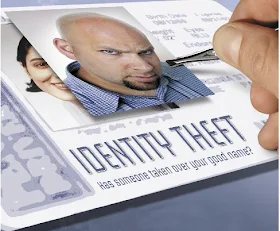 Did you know that Identity theft is a term used to refers to fraud?
Did you know that Identity theft is a term used to refers to fraud? Did you know that identity theft involves someone pretending to be someone else in order to steal money or get other benefits?
Did you know that FTC estimates that as many as 9 million Americans have their identities stolen each year?
Did you know that identity theft is a little different from identity fraud, as identity fraud is the result of identity theft?
 Did you know these types of Identity Theft?
Did you know these types of Identity Theft? - Business/ commercial identity theft- using another person's business name to obtain credit.
- Criminal Identity theft- Posing as another when committing a crime.
- Financial Identity Theft- Using another identity to obtain goods and services.
- Identity Cloning- Using another information to assume his or her identity in daily life.
-
Medical Identity Theft- Using another information to obtain medical car or drugs.
- Identity Theft In The Media- Stealing someones identity to receive the praise and attention of the victims achievements.
Did you know how Identities Are Stolen?
Identity theft starts off as a misuse of your personally identifying information such as your name, social security number, credit card numbers, or other financial account information?
- Dumpster Digging- Thief's can rummage through trash looking for bills or other paper with you personal information on it.
- Skimming- Identity thieves can steal credit/debit card numbers by using a special storage device when processing your card.
- Phishing- They can pretend to be financial institutions or companies and send spam or pop up messages to get you to reveal personal information.
- Changing your address- They can divert your billing statements to another location by completing a change of address form.
- Old Fashion Stealing- Like common theft reputations they can steal wallets, purses, and mail including bank and credit card statements, and new checks or tax information. They can steal personal records, or bride employees who have access.
- Pretexting- Identity thief's can use pretenses to obtain personal information from financial institutions, telephone companies, and other sources.

1. Guard your Social Security number. It is the key to your credit report and banking accounts and is the prime target of criminals.2. Monitor your credit report. It contains your SSN, present and prior employers, a listing of all account numbers, including those that have been closed, and your overall credit score. After applying for a loan, credit card, rental or anything else that requires a credit report, request that your SSN on the application be truncated or completely obliterated and your original credit report be shredded before your eyes or returned to you once a decision has been made. A lender or rental manager needs to retain only your name and credit score to justify a decision.3. Shred all old bank and credit statements and "junk mail" credit card offers before trashing them. Use a crosscut shredder. Crosscut shredders cost more than regular shredders but are superior.4. Remove your name from the marketing lists of the three credit reporting bureaus to reduce the number of pre-approved credit offers you receive.5. Add your name to the name-deletion lists of the Direct Marketing Association's Mail Preference Service and Telephone Preference Service used by banks and other marketers.6. Do not carry extra credit cards or other important identity documents except when needed.
7. Place the contents of your wallet on a photocopy machine. Copy both sides of your license and credit cards so you have all the account numbers, expiration dates and phone numbers if your wallet or purse is stolen.8. Do not mail bill payments and checks from home. They can be stolen from your mailbox and washed clean in chemicals. Take them to the post office.9. Do not print your Social Security number on your checks.10. Order your Social Security Earnings and Benefits statement once a year to check for fraud.11. Examine the charges on your credit card statements before paying them.12. Cancel unused credit card accounts.13. Never give your credit card number or personal information over the phone unless you have initiated the call and trust that business.14. Subscribe to a credit report monitoring service that will notify you whenever someone applies for credit in your name.

Now if you didn't know, now you know...
To see more did you know that trivia click here

No comments:
Post a Comment
Thank for following